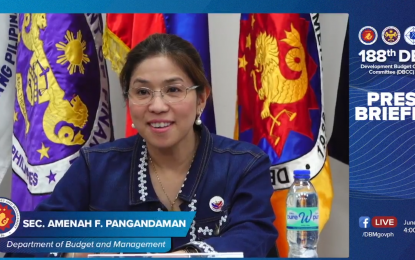
2025 BUDGET. Development Budget Coordination Committee (DBCC) chairperson and Budget Secretary Amenah Pangandaman announces that the proposed national budget for 2025 is set at PHP6.352 trillion during a press briefing on Thursday (June 27, 2024). Pangandaman said the DBCC will submit to Congress the proposed 2025 national budget on July 29, one week after the third State of the Nation Address (SONA) of President Ferdinand R. Marcos Jr. (Screengrab)
MANILA – The inter-agency Development Budget Coordination Committee (DBCC) has pegged at PHP6.352 trillion the proposed national budget for 2025, its chairperson announced on Thursday.
In a press briefing following the meeting, DBCC chairperson and Budget Secretary Amenah Pangandaman said the proposed spending plan for next year is equivalent to 22 percent of the gross domestic product (GDP), and 10.1 percent higher than this year's budget of PHP5.768 trillion.
Pangandaman said the DBCC will submit to Congress the proposed 2025 national budget on July 29, one week after the third State of the Nation Address (SONA) of President Ferdinand R. Marcos Jr.
The proposed budget is anchored on the theme “Agenda for Prosperity: Fulfilling the Needs and Aspirations of the Filipino People".
In line with the Philippine Development Plan (PDP) 2023-2028, the proposed budget for next year aims to develop and protect the capabilities of individuals and families, transform production sectors to generate more quality jobs and produce competitive products, and foster an enabling environment encompassing institutions, physical and natural environment.
Growth targets for 2024 to 2028
During the same briefing, Pangandaman said the DBCC maintained its economic growth targets for this year through 2028.
Pangandaman said the Philippine economy is expected to "finish strong" at 6 to 7 percent in 2024, and expand further to 6.5 to 7.5 percent in 2025.
"Despite external headwinds, we are expected to continue surpassing most emerging economies," she said.
She added the "robust growth momentum" is expected to continue over the medium term with a GDP projection of 6.5 to 8 percent from 2026 to 2028.
"We are committed to implementing growth-enhancing strategies to mitigate these risks such as sustaining government efforts to address inflation, promoting and adopting digitalization to improve efficiency in government spending, accelerating infrastructure development, expanding skills development for our workforce, and strengthening inter-industry supply chain linkages, among others," Pangandaman said.
"This growth trajectory puts us firmly on the path to becoming an upper-middle-income economy in less than two years and reducing the poverty rate to single-digit levels by 2028," she added.
Meanwhile, Pangandaman said the DBCC expects inflation to settle between 3 percent and 4 percent this year, closer to the previous assumption of 2 to 4 percent.
Pangandaman, however, said the country's inflation outlook is "significantly lower than the average inflation in other emerging markets and developing economies at 8.3 percent and the global average of 5.9 percent, as projected by the International Monetary Fund (IMF).
The DBCC expects inflation to be within the 2 to 4 target range between 2025 and 2028 through the proactive implementation of monetary policy measures and well-targeted government interventions that address the primary drivers of inflation.
"This includes implementing the new Comprehensive Tariff Program for 2024 to 2028 to improve the affordability of essential commodities amid the rising global prices, and the Food Stamp Program to mitigate the impact of elevated food prices on the poor and vulnerable sector," Pangandaman said.
The DBCC lowered its assumption for Dubai crude oil prices this year to USD70-USD85 per barrel from the USD70-USD90 range previously.
"The assumption of USD65 to 85 per barrel from 2025 to 2028 was maintained as global oil production is expected to rebound over the medium term, consistent with the backwardation observed in oil futures markets," Pangandaman said.
The DBCC updated its peso-dollar exchange rate assumption for 2024 from PHP55 to PHP57 against the US dollar to PHP56 to PHP58.
"This is expected to broadly stabilize at PHP55 to PHP58 against the USD for the remainder of the medium term, given increasing tourism receipts, growing BPO (business process outsourcing) revenues, and robust overseas Filipinos remittances that will support and keep the currency stable and resilient against persisting global headwinds," Pangandaman said.
For this year, the DBCC raised its goods exports growth target to 5 percent from 3 percent, considering the "better-than expected outturn in the first quarter and an improved outlook for the global semiconductor market".
Goods exports are expected to grow to 6 percent in 2025 to 2028.
Meanwhile, the DBCC lowered its growth projections for goods imports to 2 percent in 2024 and 5 percent in 2025 amid moderation in international commodity prices alongside the impact of tight monetary policy tempering consumption and investment activity.
The previous growth targets for goods imports were pegged at 4 percent for 2024 and 7 percent for 2025.
Pangandaman said the goods imports will remain supported by sustained infrastructure investments and are expected to grow by 8 percent from 2026 to 2028.
The DBCC reviews and approves the government's macroeconomic targets, revenue projections, borrowing level, aggregate budget level and expenditure priorities and recommend to the Cabinet and the President of the consolidated public sector financial position and the national government fiscal program. (PNA)
